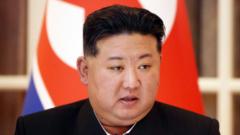In an announcement coinciding with the NATO summit in The Hague, the United Kingdom revealed its decision to purchase 12 F-35A stealth fighter-bombers. This acquisition marks a pivotal shift as it re-establishes Britain's capability to deliver nuclear weapons from the air for the first time since the Cold War's conclusion. The new F-35s will have the ability to carry both conventional munitions and nuclear bombs, complementing Britain's existing naval strategic deterrent through Trident submarines.
The addition of these aircraft to Britain's arsenal enhances NATO's nuclear posture, particularly amid growing concerns regarding the reliability of American nuclear support in an emergent crisis, especially related to Russian aggression. The U.K. government emphasized that this move constitutes “the biggest strengthening of the U.K.’s nuclear posture in a generation,” providing Britain with a second leg of its nuclear delivery triad alongside its submarine capability.
Additionally, the U.K. announced its intention to participate in NATO's airborne nuclear mission by integrating American B61 bombs stationed in Europe into its operations. While the U.K. had recently operated F-35B jets suitable for aircraft carriers, these lacked the capacity to engage in nuclear delivery, a gap now addressed by the forthcoming F-35A fleet.
As NATO members like Germany and Italy continue to host dual-capable aircraft armed with nuclear warheads, the U.K.'s capability enhancement underscores a collective European defense strategy poised to respond to contemporary geopolitical challenges with increased confidence and readiness.
The addition of these aircraft to Britain's arsenal enhances NATO's nuclear posture, particularly amid growing concerns regarding the reliability of American nuclear support in an emergent crisis, especially related to Russian aggression. The U.K. government emphasized that this move constitutes “the biggest strengthening of the U.K.’s nuclear posture in a generation,” providing Britain with a second leg of its nuclear delivery triad alongside its submarine capability.
Additionally, the U.K. announced its intention to participate in NATO's airborne nuclear mission by integrating American B61 bombs stationed in Europe into its operations. While the U.K. had recently operated F-35B jets suitable for aircraft carriers, these lacked the capacity to engage in nuclear delivery, a gap now addressed by the forthcoming F-35A fleet.
As NATO members like Germany and Italy continue to host dual-capable aircraft armed with nuclear warheads, the U.K.'s capability enhancement underscores a collective European defense strategy poised to respond to contemporary geopolitical challenges with increased confidence and readiness.





















